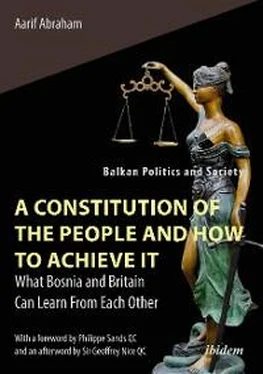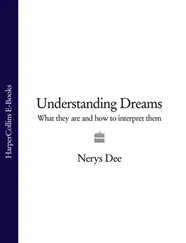Chapter 3 presents the detailed findings of quantitative research in respect of political culture in Bosnia. The Chapter, in particular, considers whether a ‘poor’ political culture (defined in Chapter 2) is the main variable explaining Bosnia’s political problems or whether there are more persuasive explanations such as institutional failure stemming from foundational constitutional structures. The Chapter roots the questions of constitutional design and amendment in the context of the real political culture of the Bosnian people and sets out why the failure to consider this culture may be helping to perpetuate conflict and simply freeze violent conflict. If Britain and Bosnia have pro-democratic political cultures, the question is posed as to what they may learn from one another in terms of their design and amendment processes.
Chapter 4 sets out the literature and theoretical principles of institutional design and amendment. It explains why changing formal rules when the underlying beliefs or values of societies remain rigidly opposed will result in failed institutions; and why a failure to change the formal institutions when belief systems are conducive to change imperils those institutions. The sub-chapters set out the three major proposals that have been made to date to reform the Bosnian constitution and the reasons for their failure. The sub-chapters will contrast that experience with the outlier case of the unwritten constitution in Britain and various reforms made to it (with a focus on those made since 1997). The sub-chapters focus on Brexit, Scottish and Northern Irish secessionism, and the unlawful constitutional practices of recent British governments. They interrogate whether it is the existing unwritten constitution (which creates a system of representative parliamentary democracy) that is the source of these crises or, rather, the by-passing of existing constitutional conventions, rules, and institutions. In the one (Britain) it poses the question of whether abandonment of its traditional unwritten constitution is the problem and in the other (Bosnia) it asks whether the foundational moment of the imposed constitution is the source of all the problems. In essence, what can one State learn from the other as calls for reform ring loud?
Chapter 5 draws on the literature in the fields of game theory and behavioural economics to model the impasse in Bosnia in light of the practical operation of Britain’s flexible constitutional arrangements. It uses game theory to present how ethno-nationalist political elites play a ‘zero-sum’ game in the current Bosnian institutions. Suggestions are made as to how they may be incentivised to give-up their strong ethno-nationalistic decision-making in the current system by introducing a third and critical actor: the people. The Chapter then suggests a solution to the impasse in Bosnia: a revolving constitution .
Chapter 6 develops the practical lessons for two disparate constitutional reform debates—that in Britain where codification is being increasingly talked about, and that in Bosnia where any hope of reform is marred by the actions of ethno-nationalist elite spoilers who benefit greatly from the current constitutional status quo. The Chapter sets out the mechanics of how a revolving constitution for Bosnia might operate and the careful calibration that is required to ensure safeguards for minority groups, human rights and stability. The Chapter also looks at how Britain may address current and future constitutional crises that clearly require redress. A model for greater deliberation and participation of the public is proposed which is in true keeping with British political culture and tradition.
The concluding remarks suggest how best to characterise a constitution and draws together the wide scholarship consulted in writing this book. The remarks identify the main lessons learned in comparing Bosnian and British constitution-making and design; some practical policy suggestions are provided on possible reform of the British and Bosnian constitutions. General lessons are drawn from the comparison made between Bosnia and Britain for both post-conflict and pre-conflict States.
Technical Methodology
This book makes use of two research methods to answer the primary research questions: (a) quantitative research to understand political culture, political apathy and political division in Bosnia and Britain; and (b) the use of rational choice models (game theory and veto player theory) and behavioural economics (prospect theory) to analyse the behaviour of political elites and the people (together ‘players’) in the current constitutional framework.
The quantitative analysis uses value-based surveys produced by the World Values Survey (WVS) and European Values Study (EVS ) to make operational the terms ‘political culture’, ‘political participation’ and ‘political apathy’ . Croatia is used as a comparative case study. 24The dataset produced by WVS and EVS conducted seven waves of studies with four each of Bosnia, Croatia and Britain in the period from 1990—2020 ( Bosnia 1998 (N=800), 2001 (N=1200), 2008 (N=1512), 2019 (N=1735 ), Croatia (1996 (N=1196), 1999 (N=1003), 2008 (N=1525), 2017 (N=1493) and Britain (1990 (N=1484), 1999 (N= 994), 2008 (N=1561), 2018 (N=1794) . 25WVS and EVS are used as they are the only dataset that collated time-series data cross-nationally on issues concerning political participation over a significant period of time. Given the lack of any other serious time-series data, and gaps in the datasets which exist, the analysis is supplemented by data obtained from other local studies where available and relevant.
The quantitative analysis forms the basis for the rest of the study. The quantitative data together with the case study on Bosnia’s institutional failure (Chapter 4) is necessary to form some of the assumptions about players’ substantive preferences and institutional structures in the rational choice analysis that follows (Chapter 5). These assumptions give empirical content to the theory and hence make it testable (Ganghof 2009). Rational choice models have explanatory power and predictive potential: in Bosnia they serve to elucidate why substantive proposals for constitutional reform are failing and suggest possible ways to break the reform impasse. The Bosnian case study allows a clearer comparison with constitutional reforms suggested for Britain. The game theory approach helps to explain complex political behaviour in a systematic way; why the behaviour of political actors is an optimal response to conditions of their political environment and the behaviour of others. Changing the context or institutions (the ‘rules of the game’) leads to changes in preferences and, therefore, outcomes. The models, therefore, provide theoretical clarity and strong explanatory power by eliminating chance or ad hoc explanations whilst acknowledging that the model is only an approximation of reality although a relatively good approximation (Tsebelis 1990, 40-47). They also explain why certain conditions and behaviour prevail, as equilibria, in a State such as Bosnia. The veto player approach, in particular, can integrate a number of approaches to institutional analyses by focusing on actors within institutions that actually matter—those that can set, alter and veto legislation (Tsebelis 1999; 2002; Ganghof 2009; Hallerberg 2010, 21).
The game theory and veto player approaches are used to model the game played by the elites in the parliamentary arena in Bosnia. The preferences of elites, however, are influenced in another important space: the electoral arena where interaction with the people (or the electorate) can alter preferences and, therefore, outcomes. The objective of the study is not to discuss the shortcomings and benefits of various institutional structures generally for Bosnia but to compare all of these structures consistently with respect to one particular objective (Tsebelis 1995): the capacity for meaningful constitutional change.
Читать дальше












